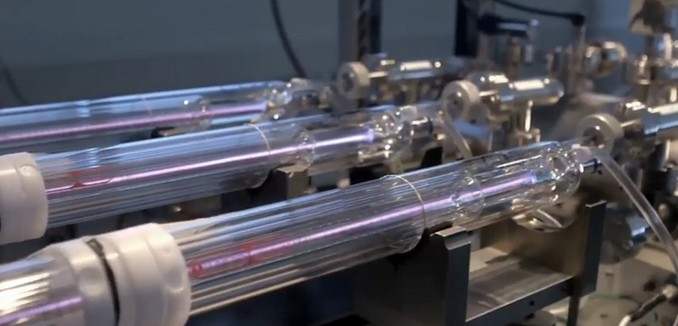In the early 1970s, when physicist Abraham Katzir was a graduate student at Hebrew University, his supervisor urged him to get into optics, the study of light. The future, he predicted, was all about lasers and optical fibers.
So Katzir studied modern optics in the United States and in 1977 established the Applied Physics Group at Tel Aviv University. His many students have made significant contributions to the burgeoning optics field – which indeed became a major industry in Israel.
Israel today is world-renowned for its optical devices and electro-optical devices (powered by electricity) for medical and military applications. More than 10,000 Israelis work in optical technologies, also called photonics. An estimated 500 optics companies in Israel contribute 5 percent of total annual exports. Almost a quarter of the exits, mergers and acquisitions in Israel over the least 15 years have been photonics related.
“This is why I started a conference 12 years ago,” Katzir tells ISRAEL21c, referring to Optical Engineering And Science in Israel (OASIS) of the Israel Lasers and Electro Optics Society, held every two years in Tel Aviv.
OASIS 2017 in February attracted 1,500 academics, researchers and industrialists – about 200 of them from Europe – and 60 exhibitors, half of them Israeli. American physicist William Moerner, 2014 Nobel Prize winner in chemistry, was a keynote speaker.
“There are very few conferences of this size in Europe, so it’s amazing for a tiny country like Israel,” says Katzir.
Carlos Lee, president of the European Photonics Industry Consortium (EPIC), came to Israel in January to lay the groundwork for a contingent of 25 senior photonics executives taking part in OASIS 2017 the following month.
“What an impressive way to start the year! Meeting 30 top photonics people in Israel and visiting five companies in one day! Very impressive leading edge technology,” Lee posted after his first trip to Israel, during which he visited ISERD (Israel-Europe Research Innovation Directorate) of the Israel Innovation Authority.
At OASIS, the EPIC delegation signed a memorandum of understanding with the Israel Association of Electronics and Software Industries for future collaboration with Israeli photonics industries.
Some of the companies on Lee’s itinerary were Ophir Photonics Group, Orbotech, LAS Photonics, Prolog Optics, Duma Optronics, KiloLambda, HP Indigo and Solar Paint.
Total Israeli sales in optics equal approximately $4 billion a year. Much of that is in missile defense and night-vision systems from companies such as Elbit, Rafael, and Israel Aerospace Industries.
Katzir estimates that 15 Israeli optics companies each ring up annual sales of more than $100 million.
Elbit Systems’ electro-optics subsidiary, Elop, is the largest electro-optics company outside the United States. Based in Rehovot, Elop’s electro-optic systems and products for defense, space and homeland security are used internationally. In 2015, Elbit’s electro-optics segment brought in $231.9 million in revenues.
Israeli companies are no less prominent in the consumer space.
Lumenis, the world’s largest energy-based medical device company for surgical, aesthetic and ophthalmic applications, is marking its 50th year. Based in Yokneam with offices across the globe, Lumenis was acquired for $510 million by Chinese private equity fund XIO in 2015.
Two other Israeli optics superstars are Mobileye, the Jerusalem-based developer of vision-based advanced driver assistance systems and autonomous driving technologies, which was just purchased by Intel for $15.3 billion; and Medtronic (previously Given Imaging) in Yokneam, maker of diagnostic products — most famously, PillCam — for visualizing and detecting gastrointestinal tract disorders.
Aside from Mobileye, several Israeli optics companies have scored investments in the past year:
Lumus Vision of Rehovot, creator of transparent displays for augmented reality eyewear, completed a $45 million investment round last December. Lumus optical technology also is used in healthcare, military aviation and logistics sectors.
Innoviz Technologies of Kfar Saba, developer of smart 3D laser sensing, sensor fusion and mapping and localization technologies for autonomous driving, raised $9 million last August and was recently selected to participate in Startup Autobahn 2017.
Corephotonics of Tel Aviv, a startup developing dual camera technologies for smartphones, including 5X optical zoom, completed a $15 million funding round, bringing its total raise since its 2012 founding to $50 million. In February 2017, Corephotonics announced a development deal with Samsung Electro-Mechanics.
DeepOptics of Petah Tikva, developer of electronic omnifocal eyeglasses, raised $4 million in 2016 toward building a revolutionary lens prototype. AR and VR companies look to integrate DeepOptics’ electronic lenses in next-generation products. The company is fine-tuning the technology prior to commercialization.
[Photo: ISRAEL21cdotcom / YouTube ]




